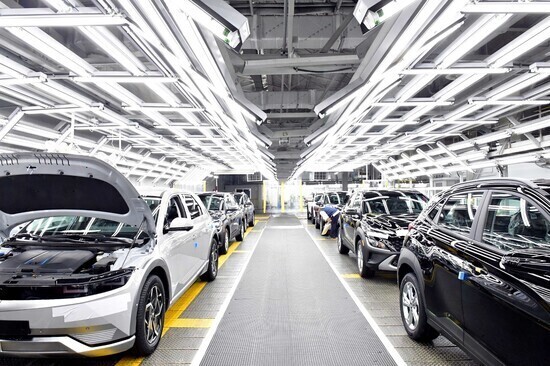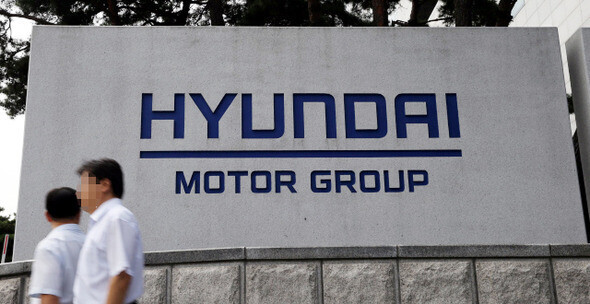hankyoreh
Links to other country sites 다른 나라 사이트 링크
Hyundai Motor faces its own great resignation of IC engine researchers

The automotive industry is in the midst of a shift. Today’s automakers need to transition from manufacturers of internal combustion (IC) engines to comprehensive mobility companies. It’s for this reason that automakers around the world are investing in the production of eco-friendly vehicles, such as cars that run on electricity and hydrogen, and new technologies such as autonomous driving and urban air mobility. The same is true of Hyundai Motor Group, the third-largest automaker in the world and Korea’s top auto manufacturer.
The key will be whether companies are able to make this shift at the opportune timing and at low costs as they maintain competitiveness by pulling in profits with internal combustion engines.
The same holds true for shifting those who work on IC engines into these newer fields.
However, there have been continuous reports in recent times of a decline in worker morale at Hyundai Motor and the departure of those in research positions — workers who will play a key role in the company’s competitiveness. Such reports have raised questions about what the actual atmosphere is like within the company.
In order to get an idea of what it’s like to work at the automaker, albeit indirectly, the Hankyoreh listened to the stories of eight people who had recently left their jobs at Hyundai Motor. Of the former Hyundai Motor employees the Hankyoreh spoke to, five had left the company in 2022, two in 2021, and one in 2018. On average, they had worked at Hyundai Motor for 6.2 years, with the longest having worked there for 10 years and the shortest for two years and eight months.
The atmosphere they conveyed was similar to assessments that have come from within the company and beyond. For starters, they said that there was an epidemic of low morale among those working in research positions.
One person (“K”) the Hankyoreh spoke to who recently joined a startup after starting at Hyundai Motor in 2012 and resigning in February of this year, said Hyundai’s research and development (R&D) organizations can be divided into two types: The first is existing R&D organizations that turn profits, and the other being organizations oriented toward preparation for the long-term future.
Hyundai Motor has formed R&D groups focused on autonomous driving, urban air mobility, and infotainment development in addition to setting up offices in Gangnam, Yongsan, and Pangyo — all aimed at luring talented workers in such emerging fields.
The issue, however, is that the company plans to, or will soon, apply a different wage system to workers in these new, long-term-oriented organizations than it uses for existing researchers.
“[The new organizations] only need to focus their efforts on R&D because there’s no actual business in operation [when it comes to their work],” shared K. “Since these are [workers focused on] future technologies, satisfaction is inevitably high, as it helps boost their value when they move to other companies.”
K noted, however, that there is “inevitably a large disparity felt by those working in the existing R&D organizations that are currently undergirding Hyundai Motor.”
“If this gap is not closed, the overall competitiveness of the R&D organizations will continue to decline until, far from leading the market, they’re full of people just staring down retirement.”
Another former employee, “N,” who joined the automaker in the early 2010s, expressed a similar sentiment.
“All [the company’s] money is being made off of internal combustion engines, but it only invests in the human resources for its future-oriented businesses, meaning the existing employees are left with an immense sense of deprivation.”
N added, “Those working in these future-oriented [organizations] often have to work cooperatively with the existing automotive R&D groups, but of course, there’s no way that cooperation could go that smoothly.”
Former employees said that such an atmosphere was contributing to an exodus of mid-level workers from the traditional R&D departments.
“There are a lot of departures from people nearing 10 years at the company, when they’re at the tail end of being an associate manager and are starting to be managers themselves. It’s a time that they start working their most passionately while looking after people who joined the company after them,” said N. “Roughly half of the 80 or so colleagues who were hired at the same time as myself have already quit.”
“C,” a former Hyundai Motor employee who left their job there this March after being hired in 2014, commented, “It’s always been the case that [some] new hires in their first or second year of working at the company will leave, but it’s worrying to see that a lot of employees who have built up a decent amount of experience have been leaving recently.”

One interesting point in these recent developments is that the growth of the mobility industry has in fact opened up an exit ramp for such workers.
With Hyundai Motor being the nation's top automaker, up to this point, there have been few options for employees hoping to leave Hyundai for greener pastures elsewhere. The expansion of the mobility industry in recent years has opened up new opportunities for those looking to work elsewhere.
While working at Hyundai Motor, C and their colleagues initially felt there was “no better place to be.” But given the burgeoning future mobility industry, C said that “it’s becoming easier to switch jobs as similar industries grow.”
Those who left Hyundai Motor also repeatedly mentioned their dissatisfaction with the performance incentive system.
“D,” who resigned from their post at Hyundai Motor earlier this year after more than eight years at the company, said, “The financial compensation offered to employees and assistant managers is still unreasonably insufficient.”
N said, “Due to the warped wage structure that starts employees off with low base salary and a lot of performance-incentive pay, my annual salary didn’t budge from 70 million won for eight years. When I was promoted to a senior level, it went up 20 million won and then didn’t budge again.”
“I felt like a fool for pulling so much overtime,” N added.
“E,” who transferred to a venture capital (VC) firm in February last year after working at Hyundai Motor for close to three years, criticized labor-management negotiations as being centered on improving the treatment of production workers.
“Researchers who are sandwiched between the company and the production workers don’t have all that much sway,” E said.
“If they only work on improving the system centering around production, then it’s likely that the mass exodus [of researchers] is going to continue on, or even accelerate,” E added.
Accordingly, experts advise that Hyundai Motor should pay closer attention to the company’s treatment of workers in its more traditional research fields as well as how to shift over their duties amid the macro-level changes in the industry, the reason being that steady-selling IC engines are not going anywhere for now.
Lee Ho-geun, a professor of automotive engineering at Daeduk University, said in a phone call with the Hankyoreh, “If you look at the eco-friendly vehicle supply plans, even in 2030, only 25%-30% of global auto sales are slated to be eco-friendly cars, and the rest are internal combustion engines, so continued R&D [on this front] is needed.”
“If current researchers leave because they don’t see a future at the company, [the company] may take a hit in terms of future competitiveness,” Lee added.
By Ahn Tae-ho, staff reporter
Please direct questions or comments to [english@hani.co.kr]

Editorial・opinion
![[Editorial] Penalties for airing allegations against Korea’s first lady endanger free press [Editorial] Penalties for airing allegations against Korea’s first lady endanger free press](https://flexible.img.hani.co.kr/flexible/normal/500/300/imgdb/original/2024/0502/1817146398095106.jpg) [Editorial] Penalties for airing allegations against Korea’s first lady endanger free press
[Editorial] Penalties for airing allegations against Korea’s first lady endanger free press![[Editorial] Yoon must halt procurement of SM-3 interceptor missiles [Editorial] Yoon must halt procurement of SM-3 interceptor missiles](https://flexible.img.hani.co.kr/flexible/normal/500/300/imgdb/child/2024/0501/17145495551605_1717145495195344.jpg) [Editorial] Yoon must halt procurement of SM-3 interceptor missiles
[Editorial] Yoon must halt procurement of SM-3 interceptor missiles- [Guest essay] Maybe Korea’s rapid population decline is an opportunity, not a crisis
- [Column] Can Yoon steer diplomacy with Russia, China back on track?
- [Column] Season 2 of special prosecutor probe may be coming to Korea soon
- [Column] Park Geun-hye déjà vu in Yoon Suk-yeol
- [Editorial] New weight of N. Korea’s nuclear threats makes dialogue all the more urgent
- [Guest essay] The real reason Korea’s new right wants to dub Rhee a founding father
- [Column] ‘Choson’: Is it time we start referring to N. Korea in its own terms?
- [Editorial] Japan’s rewriting of history with Korea has gone too far
Most viewed articles
- 160% of young Koreans see no need to have kids after marriage
- 2Presidential office warns of veto in response to opposition passing special counsel probe act
- 3[Editorial] Penalties for airing allegations against Korea’s first lady endanger free press
- 4[Editorial] Japan’s rewriting of history with Korea has gone too far
- 5[Column] Park Geun-hye déjà vu in Yoon Suk-yeol
- 6For survivor, Jeju April 3 massacre is a living reality, not dead history
- 7[Guest essay] Maybe Korea’s rapid population decline is an opportunity, not a crisis
- 8[Special Feature Series: April 3 Jeju Uprising, Part III] US culpability for the bloodshed on Jeju I
- 9[Column] America must frankly own up to role in tragic Jeju April 3 Incident
- 10‘My mission is suppression’: Jeju blood on the hands of the US military government